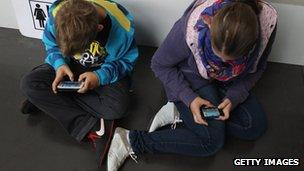Phone bill warning to parents over mobile app charges
- Published

Some free apps were found to contain malware which unexpectedly billed for large amounts
Anger over huge phone bills caused by purchases made within mobile applications has grown.
Regulator PhonepayPlus has noted a 300% increase in complaints from consumers faced with an unexpectedly large phone bill.
Many apps can be downloaded for free, but users are then encouraged to buy extra items.
Other free apps contained malware that tricked users into running up bills, the regulator added.
Children's "naivety" on social media was also causing concern among parents, PhonepayPlus said.
The regulator said it was working with Facebook to make sure rogue offers and promotions were removed from the site as quickly as possible.
In most mobile app stores, it is free games that make their way to the top of the most downloaded charts, so many games makers have opted for the in-app sales business model.
Burning holes
Many titles, such as the massively popular Angry Birds, give players the chance to progress more quickly in the game by spending small amounts of money.
PhonepayPlus said its figures suggested that two in three 11- to 16-year-olds had downloaded their own apps.
The regulator warned that parents could see bills of "hundreds or even thousands of pounds" as a result of these in-app purchases.
In one of the more extreme cases, it was reported that children had downloaded counterfeit versions of games from Google's Android app store.
These games were infected with malware which, whenever opened, billed £15 to the user's phone bill without their knowledge.
PhonepayPlus' chief executive Paul Whiteing said parents must be vigilant.
"Connected devices will define the age in which today's children live and we are determined to ensure that they can receive the benefits while being protected from the risks," he said.
"Smartphones in children's pockets can burn holes in parents' wallets, so we are working with partners across industry and other agencies to prevent this.
"This is a real challenge for parents and for us as a regulator, but this plan meets that challenge head on."
- Published16 April 2012
- Published6 December 2012